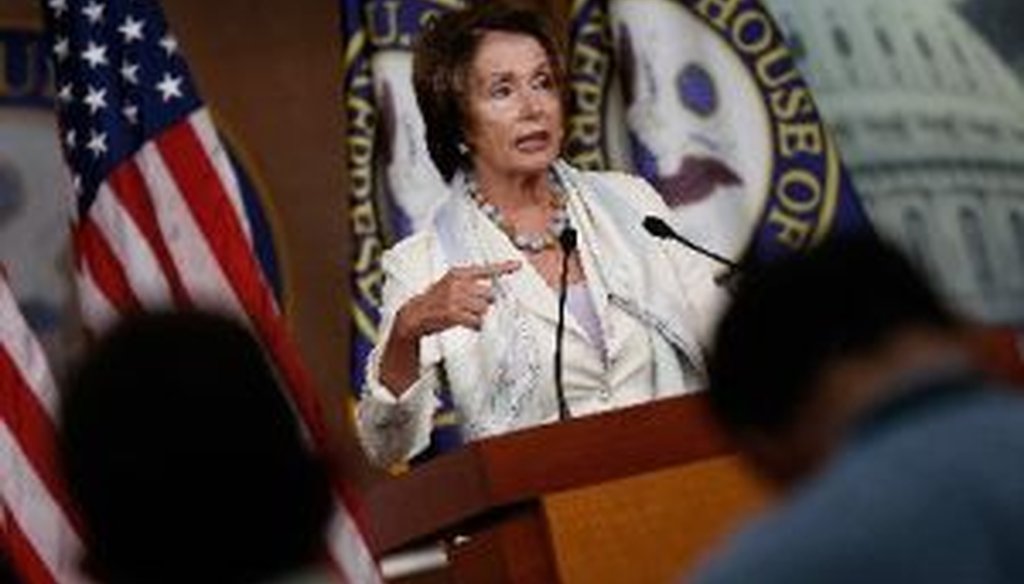

Our only agenda is to publish the truth so you can be an informed participant in democracy.
We need your help.


House Minority Leader Nancy Pelosi, D-Calif., answers questions during her weekly press conference at the U.S. Capitol on July 10, 2014.
More than 10 days after the Supreme Court decided Burwell vs. Hobby Lobby, the landmark case was still sending shockwaves through Washington and the political world.
In the decision, a 5-4 majority ruled that a closely held, private corporation, such as the craft retailer Hobby Lobby, could decline on religious grounds to pay for four kinds of contraceptives otherwise mandated in employee health coverage by the Affordable Care Act, the law proposed and signed by President Barack Obama.
At her weekly press conference on July 10, 2014, House Minority Leader Nancy Pelosi, D-Calif., referenced the decision with a note of alarm.
"Really, we should be afraid of this court," Pelosi said. "The five guys who start determining what contraceptions are legal. Let's not even go there."
Several readers asked us to scrutinze whether Pelosi was right to say that the Supreme Court was deciding which contraception methods are legal, rather than whether some corporations must pay for them through their employees’ health insurance plans.
Later that day, Fox News Channel host Megyn Kelly took the media to task for not immediately shooting down Pelosi’s assertion.
"I’ve seen the media rush to clarify Ms. Pelosi’s misleading remarks … Oh, no, I have seen none of that, except on Fox News," Kelly said sarcastically. "When you’ve got somebody in such a powerful a position as Nancy Pelosi, in a position to influence so many people on such a platform, come out and tell blatant falsehoods, there should be some fact-checking. Where is PolitiFact on that? Where is the mainstream media calling her to account?"
Well, here we are.
We can eliminate any reader suspense by sharing the response Pelosi’s office sent PolitiFact after we inquired: "She misspoke," spokesman Drew Hammill acknowledged. "Obviously the impact of the court’s decision is not to make these four contraceptive methods illegal – i.e. no longer allowed to be sold."
Hammill went on to explain that Pelosi’s "overriding point" was that the decision "does in fact limit access … which is the key point Pelosi made." He pointed to portions of Associate Justice Ruth Bader Ginsburg’s dissent in which Ginsburg notes that IUDs are expensive and that removing company support for them could leave some female employees without the "most effective" medical option for their needs.
Indeed, one of Pelosi’s later comments from the news conference -- when she focused on the issue of who pays for contraceptives, rather than whether they remain legal -- seems to be on firmer ground. She expressed concern "that five men could get down to specifics of whether a woman should use a diaphragm and (whether) she should pay for it herself, or her boss. It's not her boss' business. The business is whatever his business is, but it's not what contraception she uses."
We asked legal experts whether it was plausible to think that the Supreme Court would actually make certain kinds of contraceptives illegal, as Pelosi’s now-disowned comment suggested. The experts agreed that the scenario was farfetched.
"There is no reason to think the Court will ban any contraceptives," said Susan Bloch, a constitutional law professor at Georgetown University. "Hobby Lobby involved the question of whether a company can, for religious reasons, refuse to pay for health insurance that covers certain contraceptives. Hobby Lobby does not relate to the legality of contraceptives at all."
Kurt Lash, a University of Illinois law professor, agreed. Pelosi’s original comment, he said, suggested "either that the Supreme Court has started 'determining what contraceptions are legal,' or that recent decisions suggest that a majority might be heading in that direction. Neither is true, or even plausible."
As evidence, Lash cited solid legal precedent in favor of making contraceptives legal. Regardless of the court’s recent jurisprudence, Lash said, "it is -- and will be -- ‘legal’ for employees to obtain contraceptives on their own. Employees have that right as a matter of constitutional law under the Supreme Court's 1965 decision in Griswold vs. Connecticut, a case no one is challenging anywhere in the country and which is not implicated in any way in the ACA litigation."
In fact, he added, "even if a majority of the the Supreme Court reversed Griswold -- something that will never happen under the Roberts Court -- this still would not make contraceptives ‘illegal.’ At most, it would leave the matter to the states to decide for themselves. And every state allows the distribution of contraceptives and has done so for decades, even prior to the Court's 1965 decision in Griswold."
Our ruling
Pelosi said, "We should be afraid of this court, the five guys who start determining what contraceptions are legal."
This sweeping claim was a misstatement, her spokesman acknowledged to PolitiFact. The Hobby Lobby decision didn’t turn on whether certain types of contraception should be legal, but rather on the question of whether certain corporations could decide on religious grounds not to pay for specific types of contraceptives in employee health insurance plans. Experts say that there are solid legal precedents that would keep the Supreme Court from actually banning forms of contraception outright.
We rate the claim False.
Nancy Pelosi, transcript of press conference, July 10, 2014
Megyn Kelly, Fox News segment on Nancy Pelosi’s comments, July 10, 2014
U.S. Supreme Court, decision in Burwell vs. Hobby Lobby, June 30, 2014
The Hill, "'We should be afraid of this court,'" July 10, 2014
Email interview with Kurt Lash, University of Illinois law professor, July 11, 2014
Email interview with Susan Bloch, law professor at Georgetown University, July 11, 2014
Email interview with Drew Hammill, spokesman for Nancy Pelosi, July 11, 2014
In a world of wild talk and fake news, help us stand up for the facts.
